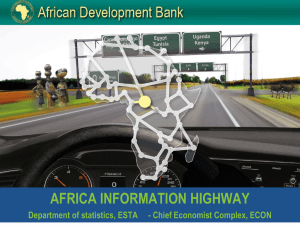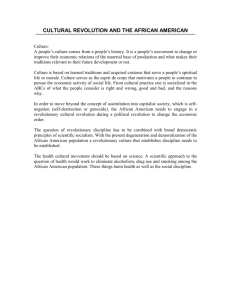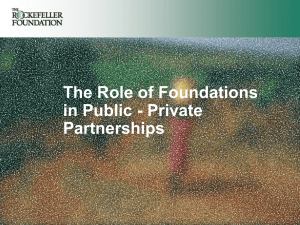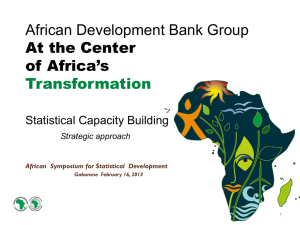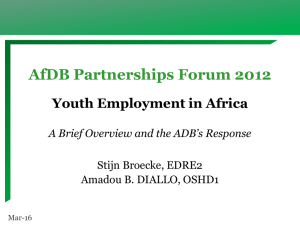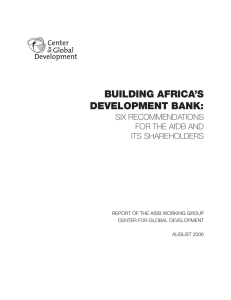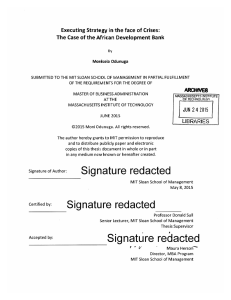Bank's contribution to Data Revolution
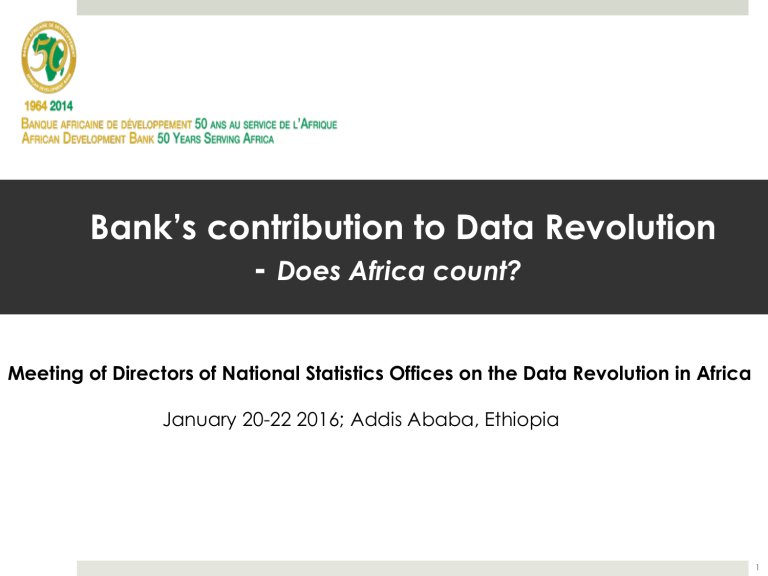
Bank’s contribution to Data Revolution
-
Does Africa count?
Meeting of Directors of National Statistics Offices on the Data Revolution in Africa
January 20-22 2016; Addis Ababa, Ethiopia
1
Table of Contents
Introduction – What is Data Revolution
How the Bank has interpreted it
Are data Strategically important for Africa
Data requirements
What are the data challenges
Addressing the challenges
What is the Bank doing
SCB - Vehicle for statistical development
Initiatives and innovations
Tragedy for Africa & other regions
High 5s priority agenda
Take Aways
2
What is Data revolution?
There are many definitions but would like to confine ourselves to a definition which is all encompassing:
The Independent Advisory Group on the Data
Revolution for sustainable development set up by the UN Secretary General defines it as: an “explosion” in volume & production of data matched by growing demand for data from all parts of society.
Further that “It must address global inequalities in access to & use of data & should aim to monitor development progress, hold governments accountable & foster sustainable development
3
How has the Bank interpreted it?
?? an “explosion” in volume & production ???
Data Revolution is not just about generating more data
BUT
It is about providing the right data to the right
people at the right time and in the right format
“Give me what I need not what I want” Trevor Manuel
– former Minister of Finance in South Africa
Data must be transformed into information
Information becomes knowledge, and that
Knowledge that can drive actions needed to stimulate transformation development eliminate poverty r
Resonates with the Bank’s position – “ A Knowledge
Bank”
4
Are data strategically Important for Africa?
YES----is where needs are greatest
High-quality, reliable and timely data are strategically important for Africa. Efforts are being made to meet the:
Exponential demand for statistics, to inform evidence-based policy and decision-making processes for the government, private sector
Needs for results measurements to monitor progress of national development strategies toward the
Sustainable Development Goals
Aligned to the Banks TYS 2013-2022 & the
The High 5s
5
Data requirements for Data Revolution
Data required:
Africa 2063 agenda and
SDGs (within the framework of the Bank TYS
& High 5s)
https://sustainabledevelopment.un.or
g/focussdgs.html
Scope of data requirements is challenging, and demands a significant scaling up of efforts to boost statistical capacity across the region
6
What are the data challenges?
Despite the remarkable progress in African statistical systems over the past decade, three main fundamental challenges still exist :
Weak and inadequate legal & organizational frameworks (incl. IT & legal infrastructure);
Shortage of statistical manpower & skills to meet the ever-increasing demand for data ;
Persistent need in the region for increased financial resources for statistical development
& activities exist:
7
Addressing the challenges
Sterling work has been done to build a firm foundation for statistical development in Africa over the past decade, including :
Many regional & subregional bodies created in collaboration with UN
Statistical Commission, subregional organizations and development agencies; with
Overarching firm commitment to good governance and adherence to international standard & best practices.
exist:
8
What is the Bank Doing?
Bank’s support for Statistics
Over the past 10 years, the Bank has provided grants of over US$ 100 million for statistical capacity building in its member countries. Its support covers the following:
development of statistical infrastructure (incl. National Statistical
Development Strategies);
harmonization of data generation and dissemination practices and standards across all its member countries;
training programs for officials from member countries and Regional
Economic Communities ;
launching of the African Information Highway (or AIH) which includes the
Open Data and the Data Portals;
leading the International Comparison Program for Africa (or ICP);
launching the Africa Infrastructure Knowledge program (or AIKP);
support on the labor force surveys and households surveys ;
development of the “Strategy for improving Statistics for Food Security,
Sustainable Agriculture and Rural Development” including the Food
Security Data Portal;
Supported the “wave” of GDP re-basing exercise & development of business statistical registers
9
Vehicle for statistical Development
SCB a “vehicle” for statistical development
Implemented by the African Development Bank since 2004 in collaboration with major development partners
Under the program AfDB has committed over US$
100 million in grants to support:
Strategy, organizational and methods development to promote statistical infrastructure
Adaptation of international statistical standards to conditions in RMCs
Harmonization of data generation and dissemination practices for data comparability across RMCs with the rest of the world
Training of RMC and SRO officials to strengthen statistical capacity
10
Some of the initiatives under SCB
The African Information Highway (AIH)
Launched in 2012
Data Portals/Open Data systems with common IT Platforms installed in all 54 African countries and 16 African subregional and regional organizations
One-stop shop to all data necessary for managing and monitoring development results in African countries
Advocacy for Population and Housing Censuses
Undertaken by ASSD
Resulted in the highest participation by RMCs in any round to date, with 50 African countries participating in the 2010 round of World Population and Housing Census by end-2014 compared to 35 in 2000 round
International Comparison Program for Africa (ICP)
Managed by AfDB since 2002 to measure price levels and economic aggregates in real terms across Africa
Capacity-building platform for price statistics, national accounts and related statistics and adopting best practices in economic and social statistics
Civil Registration and Vital Statistics
Implemented by AfDB in collaboration with other Pan Africa institutiions
11
Initiatives under SCB Program (cont.)
Africa Infrastructure Knowledge Program (AIKP)
Adopts a longer-term perspective in providing a framework for generating country-level knowledge on infrastructure on a more sustainable basis
Provides benchmarks for measuring improvements in infrastructure services to ensure that finances are directed where they will have the greatest impact
Labor Statistics: the Bank assists RMCs to improve their labor statistics through:
operational and methodological guidebooks for conducting labor force and household surveys
Assisting countries with the undertaking of labor surveys and labor statistics classifications
Providing training for African sampling statisticians
Improving Data on Food Security, Sustainable Agricultural and Rural Development
Under the Global Strategy for Improving Statistics for Food Security,
Sustainable Agriculture & Rural Development, the Action Plan for Africa was formulated by AfDB, UNECA, & the FAO
Rebasing of GDP & reviews
Several countries already assisted with GDP rebasing by AfDB in collaboration with the World Bank and IMF, with 35 countries due to rebase in the near future
Peer review of national accounts
Preparation of Country Statistical Profile (CStP)
diagnostic and programming tool for evaluating the national and sector development strategies
12
Recent Innovations in Methods of Data
Collection and Management
Under the AIH initiative, the AfDB promotes the use of advanced technology through:
Quick surveys using mobile phones, hand held devises and tablets
Implemented on pilot survey of youth unemployment in DRC, Tunisia and a CWIQ survey in Uganda using a combination of telephone calls from call centers and tablets
Weekly data collection of prices for food items
AfDB in collaboration with EU’s Joint Research
Center currently undertaken in 40 African countries using its AIH web platform
Data Collection undertaken by national agricultural extension systems
Expand on weekly food price data collection using mobile phones and tablets technology in multiple locations using extension officers
13
Recent Innovations in Methods of Data
Collection and Management (cont.)
Data Dissemination to Farmers
Providing weekly market food price data to farmers in distant markets through cell phone
Creation of Farmers’ Registries
Pilot phase initiated in Zambia with records on over 10,000 farmers collected & to be initiated in Tunisia and expanded progressively to other countries .
Digital Farm Mapping
Provide maps of all farms or agricultural land in participating countries
Overall will provide ideal frames for Agriculture.
Related surveys
14
Tragedy for Africa & other developing regions
Real Tragedy...
Rear View Mirror is shattered…..
Playing Catch up…..
New methodologies & guidelines i.e MDGs>>SDGs
Moving target --- new indicators
…..Difficulties to cope with pace of development…
Because of challenges countries face..…
Inadequate legal & institutional framework
Poor infrastructure facilities
Inadequate trained personnel
Poor funding
15
Opportunity
Playing catch up can be an opportunity
Take advantage of being latecomers
Not doing same the way as others have done
Learning from other’s mistakes
Leapfrog to latest solutions
Take note of the existing ecosytems
Harnessing all this …. for sustainable development
16
High 5 priority agenda
17
Take Aways……..
18
Take Aways……..
What have we established about Data Revolution:
Its about.
.
Fixing basic nuts & bolts in the data generation chain
System-wide coordination & management
Investing in human resources development & production of statistics
Data Dissemination & Use
Going forward
The Bank through its SCB program will continue to provide support to build sustainable statistical capacity in RMCs to respond to SDGs & the High 5s (light up & power Africa; Feed
Africa; Integrate Africa; Industrialize Africa; and Improve the quality of life for the people of Africa)
EASTA will continue to work with operation departments to identify resources from projects to support data generation in
RMCs
ESTA aspires to operate like a sector dept., to enable more resources to be allocated to support statistical activities in RMCs
19
THANK YOU
20
